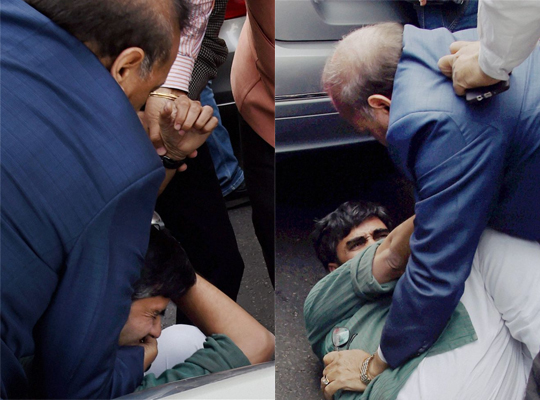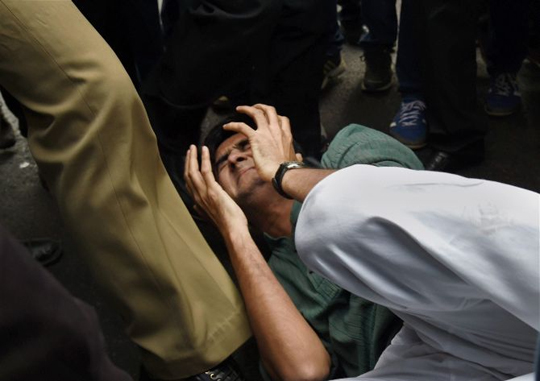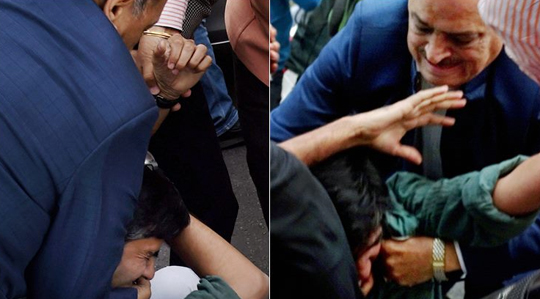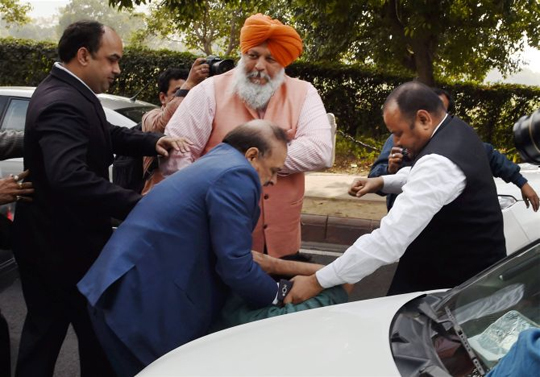New Delhi, Feb 16: Even though the photos and video clippings of Delhi BJP MLA Om Prakash Sharma brutally attacking a protester went viral, the Delhi police which is controlled by the Narendra Modi led union government is reluctant to book a case against him.
Mr Sharma has openly justified his violent act and said that he don’t even hesitate to kill someone. “Mein goli bhi maar deta agar bandook hoti. Koi hamari Ma ko gaali dega to kya usey maaroge nahin (I would have opened fire if I had a gun. If someone abuses our mother, won’t I beat him up),” said Mr Sharma when asked why he had assaulted a CPI leader at the Patiala House Courts complex Monday afternoon.
"If you ask me, there is nothing wrong in beating up or even killing someone shouting slogans in favour of Pakistan," he said.
When a few media persons brought to his notice that it was ABVP activists who raised pro-Pakistan slogans and not CPI leader, Mr Sharma refused to comment and continued to justify his act.
Responding to the incident Delhi Police chief BS Bassi meanwhile said that investigation was still on and action would be taken as per the law after identifying the people. It is learnt that police has registered FIR against ‘unidentified men’ for the attack claiming that there was no proof MLA and his supporters’ involvement in the attack. Meanwhile union home minister Rajnath Singh has appreciated Mr Bassi’s role as top cop of Delhi.
The violence
At least ten journalists and several students were assaulted Monday by lawyers and a Delhi BJP MLA inside and outside the Patiala House Courts where a sedition case against Jawaharlal Nehru University students’ union president Kanhaiya Kumar was to be heard.
The attack took place before hearing in the case got underway. A large number of policemen present there remained mute spectators.
O P Sharma, BJP MLA from Vishwas Nagar, and his supporters pinned down CPI minority cell leader Ameeque Jamei and assaulted him outside the court complex.
Inside, a group of lawyers entered the court room, raised slogans and told students, teachers and journalists to leave.
But they refused, saying they had a right to attend the proceedings. Announcing they were “patriots”, the men first targeted the students and teachers.
Calling JNU a “den of anti-India elements and terrorists”, they attacked them and then turned on the journalists present in the room, punching and slapping them. Outside the court, another group of lawyers assaulted journalists and students.
MLA Sharma, who was in the complex in connection with a hearing in the defamation case filed by Union Finance Minister Arun Jaitley, was seen assaulting Jamei.
Later, Sharma claimed he was roughed up in a melee where slogans like ‘Pakistan Zindabad, Hindustan Murdabad’ were shouted. Told there was footage of him assaulting Jamei, Sharma justified his crime and accused the victims of raising anti-India slogan.
Son of a driver
Sharma, who flaunts his proximity to Union Finance Minister Arun Jaitley, made his debut in politics in 2008 when he unsuccessfully contested the assembly elections in Delhi.
Unwilling to move out of Vishwas Nagar, he contested again in 2013 and won. When elections were held again in 2015, he was the only BJP MLA to retain his seat.
Sharma’s father was a driver in the Municipal Corporation of Delhi and he was born in the staff quarters of corporation employees at Kashmere Gate. The eldest of three sons, Sharma graduated from Satyawati College where he was college president. He also contested the Delhi University students’ union election and was an executive member of the team which Jaitley headed as president.
He once worked as an employee of the municipal corporation. After his father died, he became an inspector in the house tax department. He quit the job within a year and started taking care of sweets shops his family owns.
One of these shops was “raided” by AAP MLA Alka Lamba last year, leading to acrimonious scenes in the Delhi assembly and Sharma’s suspension after he made derogatory remarks about her. His wife Geeta too tried to enter politics by contesting the municipal elections in 2002 but was defeated. Sharma has two sons — the younger, Chetan, is a lawyer while the elder, Vikas, runs the sweets shop. He also owns showrooms of leading sports brands.










Comments
Game maker BJP and his supporting Media is doing very good job just to protect HR minister... just to windup Rohith vennula issue.... keep it up BJP ....
If this MLA has guts let him go to our border and fight against Pakistani infiltrators. Gali mein kutthe bhi sher banjaatahain.
These politicians are looting our nation's money and saying them self as Desh premies. Looters of our nation are also called Desh Drohies.
Add new comment